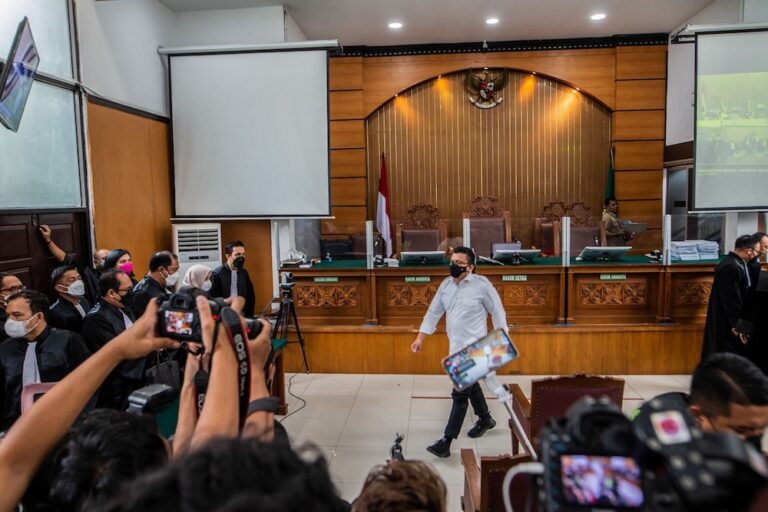(CPJ/IFEX) – The following is a 7 November 2002 CPJ press release: EAST TIMOR INDICTS TWO INDONESIAN MILITARY OFFICERS FOR MURDER OF DUTCH JOURNALIST New York, November 7, 2002-The Committee to Protect Journalists (CPJ) welcomes yesterday’s indictment in East Timor of two suspected murderers of Dutch journalist Sander Thoenes, who was killed in Dili on […]
(CPJ/IFEX) – The following is a 7 November 2002 CPJ press release:
EAST TIMOR INDICTS TWO INDONESIAN MILITARY OFFICERS FOR MURDER OF DUTCH JOURNALIST
New York, November 7, 2002-The Committee to Protect Journalists (CPJ) welcomes yesterday’s indictment in East Timor of two suspected murderers of Dutch journalist Sander Thoenes, who was killed in Dili on September 21, 1999, while he was reporting for The Financial Times and The Christian Science Monitor. Arrest warrants for both men, who are Indonesian military officers, are expected to be forwarded to the attorney general of Indonesia and to Interpol, which East Timor joined in October.
“Indonesian authorities will now have two options,” said CPJ executive director Ann Cooper. “Either prosecute the suspects, who are on active duty in the Indonesian military, or extradite them immediately.”
On November 6, the Special Panel for Serious Crimes of the Dili District Court issued indictments against Maj. Jacob Sarosa and Lt. Camilo dos Santos for 17 counts of “crimes against humanity” committed by Indonesian army Battalion 745 in September 1999, said the United Nations Mission of Support in East Timor. The indictment includes the murder of Sander Thoenes.
The Indonesian Embassy in Washington, D.C., did not return calls seeking comment. But Indonesia has refused to extradite eight other Indonesian citizens and military officials who have been indicted in East Timor for “crimes against humanity.”
Thoenes was one of two journalists killed in the violence that followed East Timor’s August 30, 1999, vote for independence from Indonesia. As anti-independence militias went on the rampage with support from the Indonesian military, journalists were deliberately targeted in an apparent effort to ensure that there would be no witnesses to the atrocities. At least 1,000 people were killed in the violence, according to United Nations estimates.
East Timorese prosecutors claim that members of Indonesian army Battalion 745 killed Thoenes. Sarosa was commander of the battalion at the time, and dos Santos was a platoon commander. Agence France-Presse quoted Stuart Alford, a prosecutor in East Timor’s Serious Crimes Unit, as stating that “soldiers from the battalion walked up to [Thoenes] and shot him single-shot in the chest…effectively point-blank range.”
In April 2000, Indonesia’s attorney general designated Thoenes’ murder as one of five top-priority cases for a special investigations team charged with prosecuting crimes committed in East Timor. However, more than two years later, Indonesian authorities have failed to acknowledge credible evidence, gathered during separate investigations carried out by the United Nations, Dutch authorities, and The Christian Science Monitor, indicating that members of Battalion 745 were directly involved in Thoenes’ killing. In June, a spokesman for the Attorney General’s Office announced that prosecution efforts in the case were being abandoned for lack of evidence. A month later, Indonesian prosecutors promised the case would be re-opened, but there has been no discernible progress.
CPJ is a New York-based, independent, nonprofit organization that works to safeguard press freedom worldwide. For more information about press conditions in East Timor and Indonesia, visit www.cpj.org.


